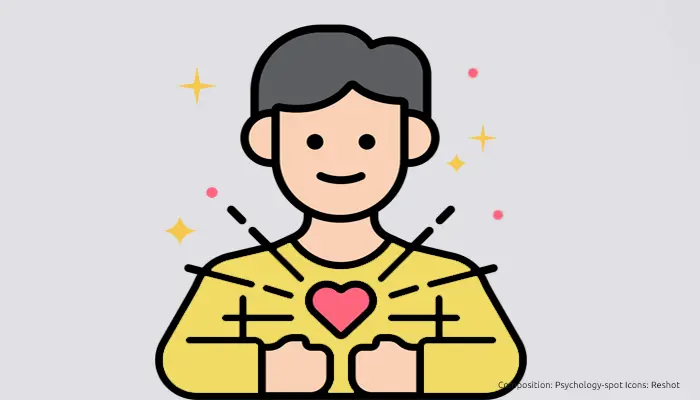
Having a solid self-esteem not only makes us feel better about ourselves, it also becomes the foundation that sustains us when we undertake a project, instilling confidence and strength in us. Self-esteem helps us to better face adversities, frustrations, and failures, as well as allowing us to build deeper, lasting, and developing ties.
However, sometimes self-esteem becomes a double-edged sword, especially when it depends too much on external circumstances or the opinions of others. In those cases, we can develop a contingent self-esteem.
What is a contingent self-esteem?
Contingent self-esteem is the tendency to change our self-evaluation based on the feedback received. The perception of our worth as people and the feelings that we profess vary according to our successes or failures and fundamentally depend on the opinions that the others have about us.
Therefore, when we are successful or receive a positive comment, our self-esteem soars, but when we make a mistake, receive criticism or suffer rejection, it crumbles. Obviously, it is a very fragile form of self-esteem because it essentially depends on external factors. Ultimately, contingent self-esteem is controlled by the others and “forces” us to meet their standards in order to gain value as persons. We leave our emotional balance in their hands.
The more self-esteem depends on the others, the more unhappy we will be
Contingent self-esteem is sustained by an introjected regulation mechanism; In other words, we do not do things because we enjoy them or consider them valuable, but because we have internalized the expectations of the others and we try to meet them, whether it is to fit in with the group, satisfy our partner, or maintain our reputation. That means we will find ourselves fighting a constant battle to maintain the status in the eyes of others.
Obviously, this need for approval generates great internal tension that can end up putting both our mental and physical health at risk. A study conducted at the University of Giessen linked contingent self-esteem with an increased risk of depression, and researchers at Stockholm University linked it to heart problems and immune diseases.
Undoubtedly, contingent or conditioned self-esteem creates an unstable base for self-image and ends up affecting our well-being. It leaves people in a situation of extreme emotional vulnerability because they do not value themselves, but their self-image and value depends on the esteem of the others.
How to overcome a relationship contingent self-esteem?
“No man is an island”, as the poet John Donne said. We are not immune to pressure and social demands. Mistakes, failures, criticism, rejection and malicious opinions hurt. However, if we have strong self-esteem, those negative experiences won’t affect us too much because we don’t tie our worth directly to them. Therefore, to have a bulletproof self-esteem it is important to:
• Understand that other people’s opinions of you are just that, opinions. Opinions are not immovable truths but personal expressions of feelings, beliefs and thoughts. They condense the reality of the other person, but they do not necessarily have to express ours. Instead of worrying excessively about what the others think, we must assume that not everyone will like us and that everyone will not understand our point of view or share our dreams or illusions. No problem! Diversity enriches us, it is not a reason to feel inferior.
• Stop comparing yourself. Relationship contingent self-esteem depends largely on our propensity to compare ourselves. We compare ourselves with others to know how well – or poorly – we are doing. However, these comparisons are poisoned fruit as they make us evaluate ourselves always taking into consideration external factors. Therefore, the healthiest comparison is the one we make with our “self” from the past because we do not come into this world to compete with others, but to improve ourselves.
• Say “no” more often. If we have a contingent self-esteem, it is likely that many times we accept things just to avoid feeling guilty, out of obligation, or to look good with others. To get out of this loop we must consider the possibility of saying “no” more often. Instead of giving in, we should ask ourselves what we want to do. Those minutes of reflection will help us find a more authentic “self” with whom we feel more comfortable and will automatically strengthen our self-esteem.
• Be kind to ourselves. People with contingent self-esteem spend a lot of time punishing or berating themselves for what they did or didn’t do. In fact, this type of self-esteem is linked to a destructive and extreme self-criticism that is based on external standards. To compensate for this excessive severity, it is convenient that we learn to treat ourselves with more kindness. This does not mean losing critical capacity but being aware that mistakes do not define us because we are people in continuous evolution.
Sources:
Johnson, M., & Rasouli, S. (2017) Contingent self-esteem structures related to cardiac, exhaustive, and immunological disease: A comparison between groups of outpatients. Cogent Psychology; 4(1): 1391677.
Schöne, c. et. Al. (2015) Contingent self-esteem and vulnerability to depression: academic contingent self-esteem predicts depressive symptoms in students. Front. Psychol;
10.3389.
Lemay, E. P. & Clark, M. S. (2008) “You’re Just Saying That.” Contingencies of Self-Worth, Suspicion, and Authenticity in the Interpersonal Affirmation Process. J Exp Soc Psychol; 44(5): 1376–1382.



